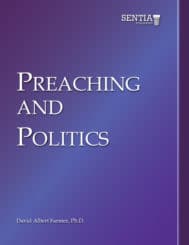
By David Albert Farmer
Every preacher must ask herself or himself with some frequency (weekly?), “What is my primary allegiance?” If one’s greatest allegiance is job security, well, honesty is good for the soul if not for sound sleep. If one’s primary allegiance is to pleasing a congregation not as much for job security as for popularity, that could also be a motivator. If one’s primary allegiance is a desire to be faithful to God and/or the teachings of Jesus, no one should be surprised. And then one may choose to preach because she or he believes preaching is primarily engagement with the socio-political order. A commitment to the latter goal will of necessity mean strong political connections, ideals, and so forth.
For the most part preachers will obviously, or not, tip their hats to their political ideologies, and frequently, especially in an election season, those ideologies can become attached to particular candidates. The preacher who is a pastor does not want to alienate members of the congregation because of political preferences; indeed, as another chapter in this book details, in the United States the preacher is forbidden by those who monitor tax exempt status for non-profit organizations such as churches from endorsing particular political candidates.
The least appealing approach is reflected in sermons in which preachers who believe God tells them who the next President of the United States should be and then entrusts the responsibility of communicating God’s will about the outcome of a political election to that preacher’s constituents. Pastor Rafael Cruz, father of failed Presidential candidate, Senator Ted Cruz, made these comments about his son as God’s choice for winner of the upcoming Presidential election (even though the Senator withdrew from the race several weeks after this news circulated):
“I implore, I exhort every member of the Body of Christ to vote according to the word of God, and vote for the candidate that stands on the word of God and on the Constitution of the United States of America. And I am convinced that man is my son, Ted Cruz. The alternative could be the destruction of America.”
God has never had or will ever have a preference for political parties or political candidates, which should have been disturbing news for Ted Cruz and his self-styled fortune-telling father.
God has never had or will ever have a preference for political parties or political candidates.
Ted Cruz’s Presidential win a fulfillment of biblical prophecy? How have First Testament scholars missed something so obvious for so many years? How is “Cruz” spelled in Hebrew? Or “Ted”?
The Word of God, the United States in 2016, and a preacher preaching about his son. Could there be anything self-serving here? And can these entities, in fact, actually be in any way connected to each other?
Church and State, despite the wisdom of the founders and framers of the Constitution, have become in the United States so wrapped up with each other the average voter perceives no difference between devotion to one’s country and devotion to God, the teachings of scripture, and other facets of spirituality. This should be beyond alarming to all citizens who utilize their freedoms to think for themselves!
Church and State, despite the wisdom of the founders and framers of the Constitution, have become in the United States so wrapped up with each other the average voter perceives no difference between devotion to one’s country and devotion to God.
The actual greatness of this nation notwithstanding, it has flaws like every human institution; yet, winners of elections for those who will serve in Washington, DC, often have gotten their positions because they have gone the furthest toward making their desired constituencies believe in the near if not the utter perfection of the nation and in the superiority of its citizens, particularly the ethnic majority in many cases, over citizens of other nations of the world. The grandiose attitudes toward nation and people are not infrequently tied, by the preacher, to the values and preferences of God.
Some foundational suggestions for balanced political preaching follow. The list is far from comprehensive.
Avoid Knee-Jerk or Reactionary Preaching
If the preacher only addresses an ethical issue when, for whatever reason, it has become a hot news topic, then the congregation will have reason to believe that its pastor is more concerned with hype than virtue. Furthermore, the preacher is not a pundit. She or he is not a news anchor person; nor should the Sunday morning sermon be confused with the Sunday televised news commentaries.
Don’t Be Lulled into LaLa Land about Our Intended Preaching Audiences
Margaret Clarkson’s lyrics, called by some the greatest missionary hymn of the twentieth century, describe the hearers to whom we “homeland” preachers are called to preach the good news of God’s unconditional love. Her final verse reads thus:
So send I you to hearts made hard by hatred
To eyes made blind because they will not see
To spend, though it be blood to spend and spare not
So send I you to taste of Calvary.
Pick Your Battles, and Don’t Expect Always to Remain Unscathed
While the preacher should never be a part of ignoring or trying to cover up the truth, not every issue deserves a battle until the time is right for a battle that must be fought. Congregations may resist reconsideration and behavior changes when too many challenges to the status quo are thrown their way at once.This said, there are times when the preacher sold out to the teachings of Jesus cannot remain silent in the pulpit about a pressing issue. And the courage needed to dare to speak must be coupled with the willingness to face the consequences of the stand that is taken.
Don’t Be Politically Engaged ONLY in an Election Season
Is immigration a critical issue in the United States, or should it be a matter of concern for a preacher/congregation even when no election is in sight? Is race relations an issue of widespread concern whether or not politicians underscore it only when they want votes? There’s a sense in which a preacher earns the right to address from the pulpit hot potato topics at election time (always without endorsing candidates) by preaching regularly about the potentially divisive issues that come to the front of citizens’ concerns.
Don’t Expect Politicians to be Moral Examples for Their Constituents
A politician who isn’t a paragon of virtue raises as few eyebrows in the early twenty-first century as a preacher who isn’t a paragon of virtue. Many of us long for persons in positions of significant influence on the lives of others to take seriously their opportunities to strengthen lives (and, thus, by ripple effect the nation and the world). Ultimately, however, mega church preachers, rock stars, actors, and politicians (not always mutually exclusive groups) cannot be held accountable for instilling ethical values in or modeling them for those needing to see how living ethically is done.
Don’t Speak in Sermons as if All Politicians Are the Same Kinds of People
Preachers doing political preaching make no real impact in calling for justice when their sermons make broad, anonymous references to “politicians” as a group of dishonest, scheming, greedy losers, always ready to sell their votes and endorsements along with their souls to the highest bidders. This, no doubt, is how more than a handful of politicians conduct themselves, but at least a few and probably well more than a few highly ethical politicians manage to get elected as honest, non-self-serving leaders who never veer from their moral foundations regardless of how many terms they serve or how high they move up the ladder of power.
Praise Politics Done Well
The preacher who is serious about meaningful, ethical political preaching will not practice a sermon methodology that could be called “slam the politician of the week.” Thankfully, there are great decisions made, courageous stands taken, ethically-grounded though unpopular associations established by politicians including those we preachers don’t consider members of our team. A preacher’s unwillingness or inability to praise stands taken by politicians not normally on the preacher’s “approved list” is a telltale sign that the preacher is trying to be an election advisor rather than a proclaimer and promoter of principles of justice.
David Albert Farmer (PhD in Homiletics, The Southern Baptist Theological Seminary) is the pastor of Silverside Church in Wilmington, Delaware and Affiliate Professor of Homiletics at Palmer Theological Seminary of Eastern University. This article is excerpted from his book Preaching and Politics (Sentia Publishing, 2016) and is reproduced here with the kind permission of the publisher.


